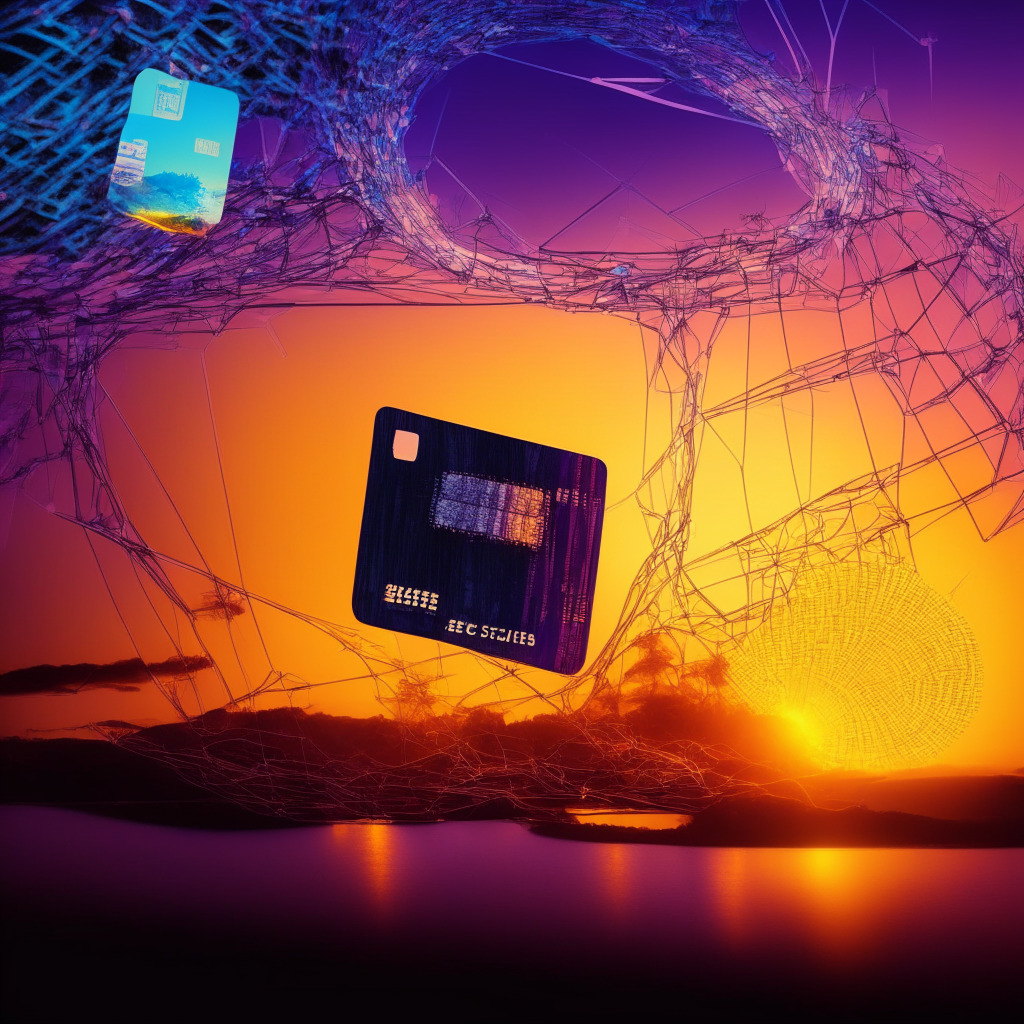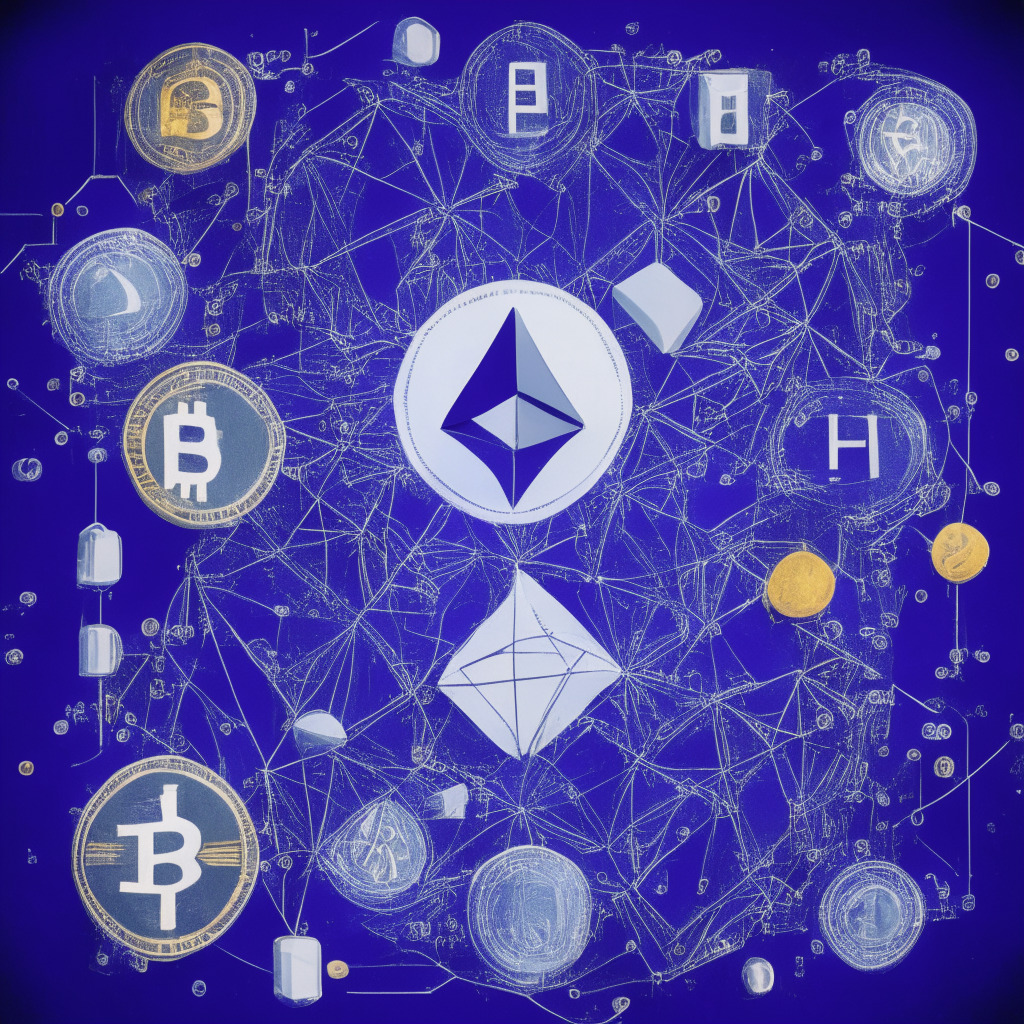Visa’s Innovation & Design VP, Akshay Chopra, emphasized the growing role of crypto cards in market activity and everyday transactions in 2021, bridging traditional finance with digital currencies. Recognizing limitations of current financial systems, he proposed blockchain-based alternatives and praised regulatory foresight in places like UAE for embracing crypto-based payments.
Search Results for: Visa
Navigating the Future of Payments: Visa’s $100M AI Venture & Crypto Integration
“Visa plans to invest $100 million in generative AI ventures, a technology that can generate various content forms and add dynamism to the industry. The firm’s AI-based solutions have been effective in fraud prevention, highlighting AI’s critical role in enhancing payment systems. However, successful AI implementation requires a robust regulatory framework.”
Surge on the Horizon: Solana Boosted by Visa, but Are Altcoins Like Bitcoin BSC the Real Winners?
Recent price increase of the Solana coin is driven by Visa’s expansion into stablecoins and integration of the Solana blockchain. Despite its downs, the coin’s indicators suggest a possibility for an upward surge. Visa’s decision recognizes Solana’s potential to be Ethereum’s competitor, which could further boost its growth.
Visa’s Solana Blockchain Integration: Ushering in a New Era of Cross-Border Payments and Crypto Adoption
Visa announced its plan to adopt the Solana blockchain for transacting with USDC, a popular stablecoin, to expedite cross-border payments. This signals a significant shift towards crypto adoption, with potential benefits including quicker transaction times and economical settlements. Meanwhile, PayPal’s involvement in stablecoins and projections of the stablecoin market reaching nearly $3 trillion in five years indicate their growing significance. Still, the highly volatile nature of cryptocurrencies requires careful evaluation before investments.
Visa Dives into Stablecoin Payments: A Futuristic Move or an Unnecessary Intrusion?
“Visa partners with Solana blockchain, venturing into stablecoin payments. This sees Visa using stablecoins like USDC and blockchain networks such as Solana and Ethereum to increase cross-border settlement speed and offer more accessible options for fund transfers via Visa’s treasury.”
VISA Leverages Solana Blockchain and USDC Stablecoin for Faster International Payments
“VISA has enhanced its stablecoin settlement ability with Circle’s USDC stablecoin on the high-speed Solana blockchain, making it one of the first financial institutions to harness Solana for scaled settlements. VISA’s integration of stablecoins like USDC on global blockchain networks aims to improve international settlements speed and give clients a modern option to conveniently transact funds.”
Visa and Mastercard Sever Ties with Binance: A Shake-up or Just a Ripple in the Crypto Market?
“Payment giants Visa and Mastercard have distanced themselves from Binance amid ongoing regulatory challenges for the leading crypto exchange. Despite this, industry experts predict modest impact on Binance’s market share. The situation illustrates how institutional caution could affect the cryptocurrency market’s future.”
Visa Maneuvers into Ethereum’s Ecosystem: Streamlining Transactions or Threatening Decentralization?
Visa has tested a method for paying on-chain gas expenses with traditional currency through card transactions, aimed at simplifying blockchain technology. Their solution uses Ethereum’s ERC-4337 standard, allowing smart contracts to cover gas fees, potentially making blockchain interactions more accessible for everyday users. However, concerns are raised about maintaining blockchain’s decentralized ethos.
Unleashing the Future of Cryptocurrency with Visa’s Ingenious Off-Chain Gas Fee Solution
Visa has initiated tests to enable cryptocurrency users to pay on-chain gas fees directly through Visa card payments. This innovative project aims to circumvent the traditional requirement for users to maintain their Ethereum balances to cover fluctuating gas fees. The process involves a “paymaster” smart contract for off-chain gas fee settlements, which could significantly simplify cryptocurrency transactions and enhance user experiences.
Worldcoin’s Audacious Move: Biometric Drawbacks Meet Visa’s On-chain Innovation
The Worldcoin project, offering Worldcoin tokens in return for scanning users’ irises to create a biometric ID system, faces skepticism and regulatory challenges globally. Despite announcing overloading of 2 Million customers before launch, the actual usage remains unclear.
Bitcoin’s Uncertain Future: A Tug-of-War at $29.3K and Visa’s Game-Changing Move
“The future of Bitcoin remains uncertain, with bulls and bears fighting for market control around the crucial $29,700 mark. Meanwhile, Visa’s attempt to lessen friction for blockchain users could revolutionize cryptocurrency wallets, allowing onsite gas fees to be paid with Visa debit cards.”
Bridging the Gap: Gnosis Fuses Decentralized Payments with Visa’s Traditional Channels
Gnosis is pioneering the integration of decentralized payment systems with conventional channels, launching products allowing users to spend their digital assets from wallets via Visa’s system. Gnosis Pay and Gnosis Card, a self-funded Visa debit card connected to an on-chain wallet, aim to simplify the movement of crypto-assets and reinforce the Gnosis blockchain ecosystem.
Ethereum Rivals Visa, Tether Hits Highs, and Global Crypto Trends: A Weekly Roundup
This week, Ethereum’s transaction volume rivaled Visa, Tether’s market cap hit a record high, and an Ethereum ICO wallet resurfaced with $15 million. Binance dominated headlines with trading discounts and privacy coin delisting news, while CBDC discussions, crypto regulations, and global partnerships shaped the future of the industry.
Ethereum vs Visa: Battle of Transaction Giants and the Future of Finance
Ethereum’s $3.01 trillion in transaction processing approaches Visa’s $3.08 trillion, showcasing mainstream adoption of the versatile blockchain technology. With solutions like DeFi, staking, and lending, Ethereum challenges traditional payment giants and revolutionizes the global finance market.
Visa Explores Ethereum’s Goerli Testnet for Transaction-Free Payments: Pros, Cons & Conflict
Visa has been utilizing Ethereum’s Goerli testnet and a smart contract called Paymaster to explore transaction-free payments in digital currencies. This method enables users to pay gas fees with any token, eliminating the need for Ether and potentially enhancing payment experiences in the crypto space.
Visa Tackles Ethereum Account Abstraction & ERC-4337: Revolutionizing Crypto Payments
Visa explores Ethereum Account Abstraction and ERC-4337 for secure automatic recurring payments and potential gas fee redesigns. This aims to improve user convenience and enable seamless digital transactions in crypto onboarding experiences. Ethereum co-founder, Vitalik Buterin, supports these innovations for self-custodial wallets.
Bridging the Gap: Circle’s Cross-Chain Protocol and Visa’s Crypto Project Revolutionize Stablecoin Payments
Circle, a global fintech firm, recently launched a cross-chain protocol that enables seamless USDC transfers […]
The Avid Debate: BTC’s Upcoming Leap – A Response to Cyclical Trends or Macroeconomic Factors?
“Analyses of Bitcoin suggest a possible decisive move in its trajectory as early as November, based on its earlier cyclical trends leading up to a halving event. However, factors like global macroeconomics and the Federal Reserve’s decisions might also play a decisive role. Despite market predictions, investors are advised to maintain a diversified portfolio and stay updated with crypto market and blockchain developments.”
Rise of the Digital Yuan: China’s Lead in Central Bank Digital Currencies and Global Impact
“China’s digital yuan experienced increased usage at the Hangzhou Asian Games, where athletes interacted with the new technology. New language features were introduced, and the currency is linked with Hong Kong’s Fast Payment System. Overseas visitors can now open a digital yuan wallet using an overseas mobile phone number, and can ‘top up first, and use later’, for smoother transactions.”
Ethereum’s Resilience Amid Crypto Market Volatility: A Deeper Look at Future Prospects
Despite a recent 6% decline, Ethereum has seen a 2.5% gain over the past two weeks, indicating possible resilience in the altcoin market. Increases in adoption, like PayPal launching an ETH-based stablecoin, suggest Ethereum’s potential for recovery despite ongoing market volatility. However, with high crypto returns come high risks.
The Launchpad XYZ Puzzle: One Platform To Rule Crypto or An Ambitious Overreach?
“Launchpad XYZ, a notable contributor in the cryptocurrency world, has secured $1.85 million in pre-sale funding, planning a robust action plan for 2023. The company aims to provide a comprehensive range of services including educational courses, trading tools, high-level analytics, and an NFT marketplace, acting as an inclusive, all-encompassing web3 ecosystem.”
Ethereum’s Tussle with Resistance & Bitcoin Minetrix: New Cloud Mining Trend
“Ethereum’s marginal drop by 0.2% with a current standing 2.5% higher than two weeks ago suggests remaining uncertainty in the cryptocurrency market. Deepening ties with PayPal and Visa provide a boost, yet its breakthrough capacity remains unsure due to global financial stability.”
Zero-Knowledge Tech Fueled W-Pay: A Revolution in Secure Crypto Transactions
“Wirex, a global digital payment platform, introduces W-Pay, an App Chain powered by Zero-Knowledge technology. Aimed at enhancing connections between DApps, non-custodial wallets, and traditional payment systems, it offers swift, secure transactions and total fund control. The Ethereum Virtual Machine compatibility ensures diverse functionalities and promotes crypto ecosystem interoperability.”
Navigating Bitcoin’s Tough Road to $30,000: Exploring the Underlying Challenges
Bitcoin’s struggle to surpass $28.5K is attributed to factors such as failed launch of Ether futures ETFs, US Federal Reserve’s economic concern, a dip in Bitcoin’s core trading metrics, and dwindling faith in the prospect of a spot Bitcoin ETF. The path towards $30,000 appears uncertain.
Cryptocurrency Showdown: SOL’s Resilience Amidst Leadership Scandal vs BTCMTX’s Rapid Growth
“SOL has shown resilience despite a slight price dip, growing by 21% within a week and 130% since year-start. Future growth is expected, indicated by its relative strength index rebound. FTX’s $1.2 billion SOL holdings create responsibility, but fears of a massive sell-off are reduced as these are mostly staked or locked.”
Argentina’s Economic Reformation: The Pros and Cons of Central Bank Digital Currency Adoption
Argentina’s economic committee is exploring the integration of Central Bank Digital Currencies (CBDCs) as a solution to the country’s economic problems. The digital peso can provide transparency, improve taxation and potentially bring stability to the economy. CBDC’s potential to reform the financial ecosystem is currently a major topic of discourse.
Exploring Crypto Expansion in Latin America and the Caribbean: Boons and Challenges
The joint study by IDB and CCAF shows remarkable growth in cryptocurrency in Latin America and the Caribbean since 2016. The report highlights the need for understanding this emerging market and ensuring its secure and sustainable growth through collaborative efforts.
Blockchain Analytics Firm Chainalysis Axes 25% Workforce amid Crypto Market Downturn
“In response to market downturns and decreased commercial demand, blockchain analytics firm Chainalysis is laying off 150 employees. The firm plans to shift focus from the commercial market to authorities, hoping to assure steady revenue. Amid declining Bitcoin prices and reduced interest in blockchain, the firm’s future lies in catering to government requirements in creating a safe and regulated environment.”
Unfolding the Blockchain Revolution: An Incorruptible Lens to Future Markets and Knowledge Sharing
“Blockchain technology, evidenced by digital currencies, is transforming our understanding of markets and data security. However, its unregulated nature and privacy implications raise concerns. Despite this, blockchain’s potential to improve market transparency and information integrity is undeniable.”
Leased Proof-of-Stake: Game-Changer or Just Another Player in Blockchain Technology?
“Blockchain technology introduces Leased Proof-of-Stake (LPoS), an innovative mechanism aimed at overcoming crypto mining complications. LPoS allows tokenholders to lease their tokens to validator nodes, improving their chance at generating new blocks and sharing transaction fees. While offering benefits such as decentralization and fixed tokens, LPoS also maintains control by restricting trade or transfer of leased tokens.”
Unearthing the JPEX Crypto Scandal: A Cautionary Tale for Investors and Regulators
“In the ongoing JPEX crypto exchange scandal, authorities have apprehended more suspects, taking the total to eighteen. As the investigation unfolds, significant wealth has been seized, and unauthorized Visa cards labeled ‘JPEX’ have been discovered. The scandal underscores the challenges of regulating emerging crypto exchanges and serves as a warning to investors about the need for diligence.”
Exploring Georgia’s CBDC Initiative: Promises, Concerns and the Future of Digital Currency
The National Bank of Georgia (NBG) is intensifying its efforts on a digital lari central bank digital currency (CBDC) and conducting a live pilot project involving nine firms including Ripple Labs. The envisioned CBDC design includes features like programmable money, asset tokenization, agricultural insurance provision, and real estate transaction automation. Despite potential concerns around monetary freedom, the project symbolizes the promising future of blockchain technology.































